短对话部分 短对话听力的一些原则 1-b2
大学英语四级复习资料·整理版
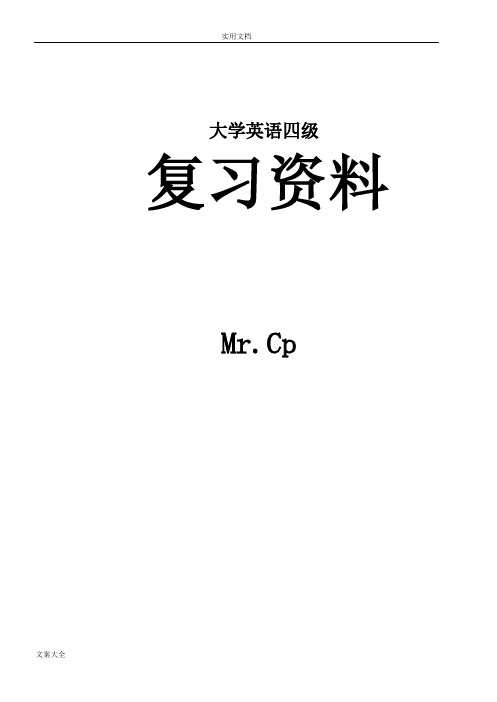
实用文档文案大全大学英语四级复习资料 Mr.Cp滴水渐累成沧海,拳石频移成泰山祝大家顺利过级目录第一部分.听力部分 (2)第二部分.最新英语四级高频词汇 (23)第三部分.四级阅读笔记 (31)第四部分.完形填空做题技巧 (36)第五部分.翻译经典练习 (38).第六部分.写作七类精彩句型 (40)第七部分.写作必备模板和句型 (42)第八部分.综合技能训练 (45)第九部分.作文训练 (73)第十部分.英语谚语警句 (85)资料说明:本复习资料非教材用书。
复习资料主要收集了四级听力、阅读、词汇、作文等一些英语四级相关的技巧、方法和内容,主要提供给有需要考四级的同学自己复习所用。
1滴水渐累成沧海,拳石频移成泰山祝大家顺利过级第一部分.听力部分一、听力内容1.Section A 对话短对话 (5分02秒) 8个对话: 4分12秒长对话 (5分58秒)Conversation 1 (4 questions):对话内容(1分45秒)+问题(1分25秒)Conversation 2 (3 questions):对话内容(1分45秒)+问题(1分02秒)2.Section B 短文(10分05秒)Directions: 35秒Passage 1 (3 questions):文章内容(1分25秒)+问题(1分10秒)Passage 2 (3 questions):文章内容(2分25秒)+问题(1分10秒)Passage 3 (4 questions):文章内容(1分45秒)+问题(1分55秒)3.Section C 复合式听写 (11分20秒)Directions: 45秒第一遍: 2分10秒第二遍:第一句停顿:1分05秒第二句停顿:1分35秒第三句停顿:1分15秒第三遍:2分10秒(以上时间根据文章内容会有所变化)二、听力技巧四级听力一直困扰着我们每一位考生,听不懂磁带中的内容是什么,不知道该如何选择,而听力在英语四级考试中又占很大一部分比重,掌握好英语四级听力技巧才能快速提高英语成绩,以下总结出几点有关英语四级听力技巧。
真题集--短对话听力的四大原则.doc
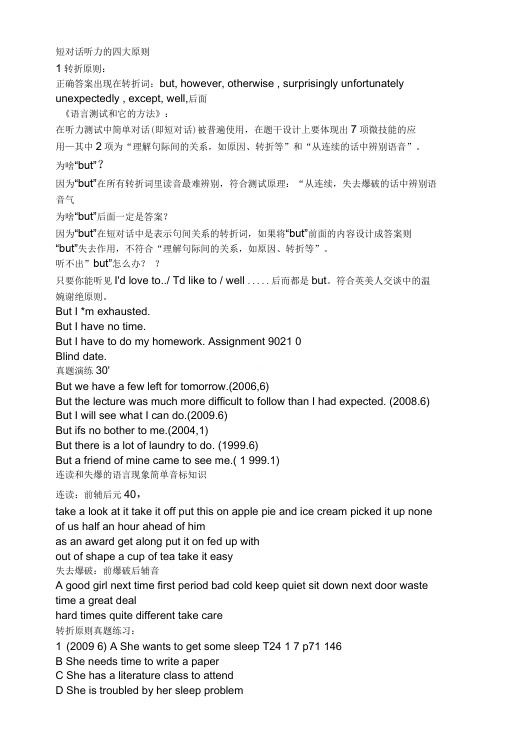
短对话听力的四大原则1转折原则:正确答案出现在转折词:but, however, otherwise , surprisingly unfortunately unexpectedly , except, well,后面《语言测试和它的方法》:在听力测试中简单对话(即短对话)被普遍使用,在题干设计上要体现出7项微技能的应用—其中2项为“理解句际间的关系,如原因、转折等”和“从连续的话中辨别语音”。
为啥“but”?因为“but”在所有转折词里读音最难辨别,符合测试原理:“从连续,失去爆破的话中辨别语音气为啥“but”后面一定是答案?因为“but”在短对话中是表示句间关系的转折词,如果将“but”前面的内容设计成答案则“but”失去作用,不符合“理解句际间的关系,如原因、转折等”。
听不出”but”怎么办??只要你能听见I'd love to../ Td like to / well .....后而都是but。
符合英美人交谈中的温婉谢绝原则。
But I *m exhausted.But I have no time.But I have to do my homework. Assignment 9021 0Blind date.真题演练30'But we have a few left for tomorrow.(2006,6)But the lecture was much more difficult to follow than I had expected. (2008.6) But I will see what I can do.(2009.6)But ifs no bother to me.(2004,1)But there is a lot of laundry to do. (1999.6)But a friend of mine came to see me.( 1 999.1)连读和失爆的语言现象简单音标知识连读:前辅后元40,take a look at it take it off put this on apple pie and ice cream picked it up none of us half an hour ahead of himas an award get along put it on fed up without of shape a cup of tea take it easy失去爆破:前爆破后辅音A good girl next time first period bad cold keep quiet sit down next door waste time a great dealhard times quite different take care转折原则真题练习:1 (2009 6) A She wants to get some sleep T24 1 7 p71 146B She needs time to write a paperC She has a literature class to attendD She is troubled by her sleep problem2 (1 999 1 ) A He watched television with his friend. T3 , 1 p6 P86B He stayed at home talking with his friend.C He went to see a film with his friend.D He went to see his school mate.3 (2006.6) A) They went a long way to attend the party. T18,1 p48 P1 20B) They didn't think much of the food and drinks.C) They knew none of the other guests at the party.D) They enjoyed the party better than the other guests.4 (2006.6) A)Helen is talkative. T 18 , 9 P48 p121B) Helen is active.C) Helen is sociable.D) Helen is quiet.5 (2006.6A)Dr. Andrews has been promoted for his thoroughnesso T18.3 p48p120B) She disagrees with Dr. Andrews on many occasions.C) Dr. Andrews used to keep his patients waiting.D) She dislikes Dr. Andrews as much as the new physician.40,2.受挫原则:(潜在规律适用原则。
大学英语四级复习资料·整理版-英语4级复习

实用文档文案大全大学英语四级复习资料 Mr.Cp滴水渐累成沧海,拳石频移成泰山祝大家顺利过级目录第一部分.听力部分 (2)第二部分.最新英语四级高频词汇 (23)第三部分.四级阅读笔记 (31)第四部分.完形填空做题技巧 (36)第五部分.翻译经典练习 (38).第六部分.写作七类精彩句型 (40)第七部分.写作必备模板和句型 (42)第八部分.综合技能训练 (45)第九部分.作文训练 (73)第十部分.英语谚语警句 (85)资料说明:本复习资料非教材用书。
复习资料主要收集了四级听力、阅读、词汇、作文等一些英语四级相关的技巧、方法和内容,主要提供给有需要考四级的同学自己复习所用。
1滴水渐累成沧海,拳石频移成泰山祝大家顺利过级第一部分.听力部分一、听力内容1.Section A 对话短对话 (5分02秒) 8个对话: 4分12秒长对话 (5分58秒)Conversation 1 (4 questions):对话内容(1分45秒)+问题(1分25秒)Conversation 2 (3 questions):对话内容(1分45秒)+问题(1分02秒)2.Section B 短文(10分05秒)Directions: 35秒Passage 1 (3 questions):文章内容(1分25秒)+问题(1分10秒)Passage 2 (3 questions):文章内容(2分25秒)+问题(1分10秒)Passage 3 (4 questions):文章内容(1分45秒)+问题(1分55秒)3.Section C 复合式听写 (11分20秒)Directions: 45秒第一遍: 2分10秒第二遍:第一句停顿:1分05秒第二句停顿:1分35秒第三句停顿:1分15秒第三遍:2分10秒(以上时间根据文章内容会有所变化)二、听力技巧四级听力一直困扰着我们每一位考生,听不懂磁带中的内容是什么,不知道该如何选择,而听力在英语四级考试中又占很大一部分比重,掌握好英语四级听力技巧才能快速提高英语成绩,以下总结出几点有关英语四级听力技巧。
六级听力短对话技巧汇总

短对话补充技巧技巧1:听到什么就不选什么“听到什么就不选什么”是一个非常有风险的“技巧”,可是,正如风险投资一样,风险越高,其回报率也就越高。
如果听到的内容实在太难,你根本就没有听到具体在说什么,而只是听到了片言只语,那么,对于短对话题来说,你还有什么办法能起死回生?这时能够救命的只有这条计策了。
本妙计何以能够成立?其依据是什么?由于短对话太“短”了,由一来一回两三句话构成,考点挖掘的余地就是对话里那几个词,因此,命题者就必然要在选项上做文章,用原文中的词汇加以组合,拼凑成与原文“貌合神离”的干扰选项。
让没有听懂原文、只是听懂原文个别词句的考生上当受骗。
而正确答案往往是原文的同义替换(或解释说明。
【例1】AThe mall placed the reading list on a desk.BThe man regrets being absent-minded.CThe woman.saved the man 80me trouble.DThe woman emptied the waste paper basket.【录音】M:1 wish I hadn’t thrown away th at reading listW:I thought you might regret it.That's why I picked it up from the waste paper basket and left it On the desk.Q:What do we learn from the conversation?【解析】答案为C。
从解题的正路来分析。
男士说:“我真希望没有扔掉那张阅读书单。
”女士回答说:“我估计你会后悔的,所以就把它从废纸篓里捡了出来.放在书桌上了。
”因此C“女士给男士省去了一些麻烦”正确。
但没听懂的考生怎么办?就只能使出绝技“听到什么就不选什么”了。
选项A、B、D中分别出现了对话中的reading list, regrets,waste paper basket,因此选C。
短对话-听力技巧-已用B2

(一)听力题型分析I、A节(Section A)1、问题类型A节每组对话一般是在一男一女之间进行的一问一答。
问题一般由先讲话的人提出。
题目均以问句形式出现,其中多数是特殊疑问句。
这些问题涉及的内容大致归纳如下:A、多用来问以下内容:1)问"是什么、要什么、讨论什么、什么种类"等,如:What is the man's answer?What does the woman want for lunch?What are they talking about?What kind of books does the man want to borrow?2)问"做什么",如:What does the woman tell the man to do first?What are the speakers doing now?What will happen if John fails the exam?3)问"什么含义",如:What does the man mean (imply)?What does the woman's answer suggest?4)问"从对话中能获得什么信息或结论",如:What can we learn from the conversation?What can be concluded from this conversation?5)问"对某人或某事有什么看法",如:What does the man think of Miss Brown?What does the woman think of the plan?B、A节中用提出的问题主要问"对话可能是在什么场所发生的",即:Where does this conversation most probably take place?Where does this conversation most likely occur?Where are the man and woman?C、可能问以下几个方面的情况:1)问钟点(可用替换),如:Man (M): What time did yesterday's football match start?Woman (W): It was supposed to start at a quarter to 7, but it was delayed an hour.Question(Q): When did the game finally start?2)问在哪个星期或星期几(后者可用替换),如:W: I thought to go to town now. I have some shopping to do.M: Don't spend too much, I won't get paid until next week.Q: When will he be paid?3)问日期,如:When will the winter vacation begin?D、用提问的问题可以问原因,也可以问目的,如:Why is the man late?Why did the man repair the car by himself?E、可能问对话者某一方的身份、对话人之间的关系或对话中涉及到的其他人的情况, 如:W: May I help you ,Sir?M: I hope so. It's my watch. I brought it in to be repaired, but I've lost the Receipt.Q: Who is the man?F、主要针对以下内容提问:1)问做某事的方式、方法或使用的交通工具,如:How did the teacher usually begin his class?How does the man usually go to work?2)问"对某事的感受如何",如:How does the man feel about the movie?How do you like the film?G、问"多少",属于涉及数字的题,可能有以下几种形式:How many persons ...?How many dozens of ... does ... want?How much does ...?How old is ...?How long does it take ... to ...?A节的问句根据疑问词划分,大致可以归为以上七类。
十个短对话听力技巧

十个短对话听力技巧
1. 集中注意力:在听力练习时,尽量避免分心,将注意力集中在听力材料上。
消除干扰因素,找一个安静的环境进行听力训练。
2. 预测内容:在听对话之前,尝试预测对话的主题和可能涉及的内容。
这样可以帮助你更有针对性地聆听关键信息。
3. 注意关键词:聆听时要特别留意关键词,这些词通常是对话中最重要的信息。
关注人名、地点、时间、数字等词语,它们有助于理解对话的背景和主题。
4. 掌握常用表达:积累常用的表达方式和固定搭配,例如问候语、感谢、道歉等,这些表达在对话中经常出现,掌握它们能更好地理解对话内容。
5. 注意细节和上下文:除了关键词外,还要注意对话中的细节信息和上下文的线索。
人物之间的关系、语气、语境等可以帮助你更好地理解对话的含义。
6. 多听多练:进行听力训练时,多听不同类型、不同难度的对话,例如日常生活对话、新闻报道、学术讲座等。
通过多样化的听力材料,可以提高对各种语境和口音的适应能力。
7. 反复听取:如果一次听完对话后仍有困难理解,可以反复听取对话材料,直到能够完全理解为止。
可以使用暂停、重放的功能,有助于强化对关键信息的理解。
8. 练习笔记:在听对话时,可以尝试做一些简单的笔记,记录关键词和重要信息。
这样有助于提高听力时的集中注意力和整体理解能力。
9. 提高听力速度:随着听力能力的提高,可以逐渐增加听力材料的难度和速度。
可以尝试一些听力训练软件或在线资源,提高听力反应速度和理解能力。
10. 持续练习:听力是一个需要长期练习的技能,每天保持一定的听力训练,积累经验和提高听力技巧。
四级听力复习技巧短对话技巧
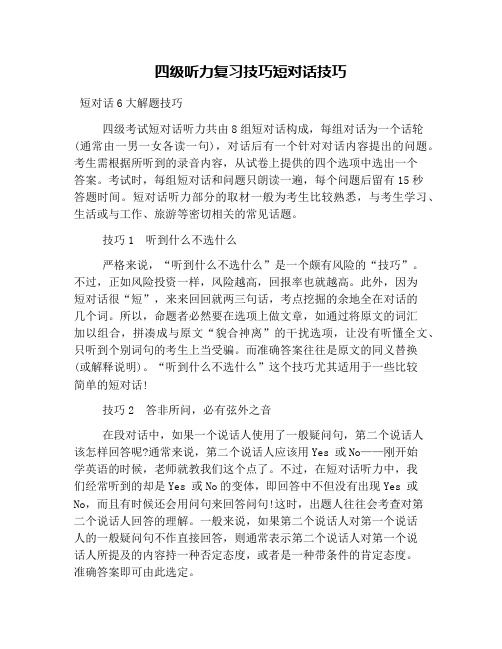
四级听力复习技巧短对话技巧短对话6大解题技巧四级考试短对话听力共由8组短对话构成,每组对话为一个话轮(通常由一男一女各读一句),对话后有一个针对对话内容提出的问题。
考生需根据所听到的录音内容,从试卷上提供的四个选项中选出一个答案。
考试时,每组短对话和问题只朗读一遍,每个问题后留有15秒答题时间。
短对话听力部分的取材一般为考生比较熟悉,与考生学习、生活或与工作、旅游等密切相关的常见话题。
技巧1 听到什么不选什么严格来说,“听到什么不选什么”是一个颇有风险的“技巧”。
不过,正如风险投资一样,风险越高,回报率也就越高。
此外,因为短对话很“短”,来来回回就两三句话,考点挖掘的余地全在对话的几个词。
所以,命题者必然要在选项上做文章,如通过将原文的词汇加以组合,拼凑成与原文“貌合神离”的干扰选项,让没有听懂全文、只听到个别词句的考生上当受骗。
而准确答案往往是原文的同义替换(或解释说明)。
“听到什么不选什么”这个技巧尤其适用于一些比较简单的短对话!技巧2 答非所问,必有弦外之音在段对话中,如果一个说话人使用了一般疑问句,第二个说话人该怎样回答呢?通常来说,第二个说话人应该用Yes 或No——刚开始学英语的时候,老师就教我们这个点了。
不过,在短对话听力中,我们经常听到的却是Yes 或No的变体,即回答中不但没有出现Yes 或No,而且有时候还会用问句来回答问句!这时,出题人往往会考查对第二个说话人回答的理解。
一般来说,如果第二个说话人对第一个说话人的一般疑问句不作直接回答,则通常表示第二个说话人对第一个说话人所提及的内容持一种否定态度,或者是一种带条件的肯定态度。
准确答案即可由此选定。
技巧3 简单回答不简单短对话听力考试中,有时对于第一个说话人的提问或者声明,第二个说话人的回答会包含“简单回答+详细解说”两部分。
其中,简短回答部分是日常口语,容易听懂;不过后面紧跟着的解说部分则往往较长,且充满了种种艰深的词汇,令人费解。
六级听力短对话技巧

短对话补充技巧技巧1:听到什么就不选什么“听到什么就不选什么”是一个非常有风险的“技巧”,可是,正如风险投资一样,风险越高,其回报率也就越高。
如果听到的内容实在太难,你根本就没有听到具体在说什么,而只是听到了片言只语,那么,对于短对话题来说,你还有什么办法能起死回生?这时能够救命的只有这条计策了。
本妙计何以能够成立?其依据是什么?由于短对话太“短”了,由一来一回两三句话构成,考点挖掘的余地就是对话里那几个词,因此,命题者就必然要在选项上做文章,用原文中的词汇加以组合,拼凑成与原文“貌合神离”的干扰选项。
让没有听懂原文、只是听懂原文个别词句的考生上当受骗。
而正确答案往往是原文的同义替换(或解释说明)。
【例1】A)The mall placed the reading list on a desk.B)The man regrets being absent-minded.C)The woman.saved the man 80me trouble.D)The woman emptied the waste paper basket.【录音】M:1 wish I hadn’t thrown away that reading listW:I thought you might regret it.That's why I picked it up from the waste paper basket and left it On the desk.Q:What do we learn from the conversation?【解析】答案为C。
从解题的正路来分析。
男士说:“我真希望没有扔掉那张阅读书单。
”女士回答说:“我估计你会后悔的,所以就把它从废纸篓里捡了出来.放在书桌上了。
”因此C“女士给男士省去了一些麻烦”正确。
但没听懂的考生怎么办?就只能使出绝技“听到什么就不选什么”了。
选项A、B、D中分别出现了对话中的reading list,regrets,waste paper basket,因此选C。
四级英语短对话技巧
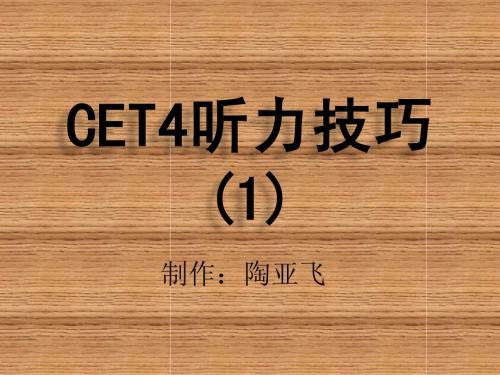
短 对 话 十 大 场 景
借车: 1. 借车:车一般是借不到的 2. 吃:匹萨,海鲜吃了一般会有不适反应,“派” 匹萨,海鲜吃了一般会有不适反应, 一般比较好吃 考试: 论文一般比较难, 3. 考试:业、论文一般比较难,或须要熬夜 教 授一般比较严厉 选修课较难较多 坐车(飞机、轮船) 4. 坐车(飞机、轮船):一般都需要等 事故(灾难) 光明原则, 5. 事故(灾难):光明原则,一般不会死人 的, . : 一般是比较有 的, 一般 是比较 难 的 论文: )或 . 论文:一般需要修 ( )或 ( ) . : 一般 或 , 一般 . :需要 1 . : 是 不到的
锦囊妙计3 锦囊妙计3:形态相似的选项预示答案 四个选项中如果只存在一组形似项, 四个选项中如果只存在一组形似项,答案极可 能是其中之一。 能是其中之一。 【例8】A)The mall has never seen the before. woman before. work. B)The two speakers work.for the same company. company. C)The two speakers work on the same floor. floor. D)The woman is interested in market research 分析】 两项非常相似,首先主语都是The 【分析】B、C两项非常相似,首先主语都是The speakers,其次谓语都是work 形态相似, work。 two speakers,其次谓语都是work。形态相似,必 留给考生较深刻的印象。 留给考生较深刻的印象。
【例6】A) The woman is driving too fast. B) The woman is driving at a low speed. C) The woman has broken a traffic rule. D) The woman has parked her car in a wrong place. 【录音】M: This is a one-way street. 录音】 oneDidn't you see the sign? sorry. didn't. W:sorry.I didn't. Q:What do we learn from the [1999. conversation? [1999.6/T9] 【解析】选C选项间存在包孕关系,C包含A和 解析】 选项间存在包孕关系, 包含A 可以初步排除A 如果B正确, D,可以初步排除A、D。如果B正确,问题很难提 因为车开得很慢通常不会引起什么矛盾) 出(因为车开得很慢通常不会引起什么矛盾),因 此在没有听录音之前就可以初步判断选C 此在没有听录音之前就可以初步判断选C
大学英语四级听力技巧(基本技巧)
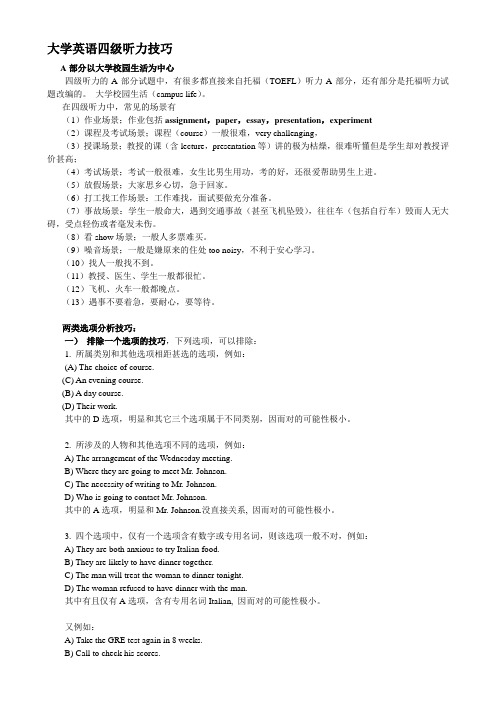
大学英语四级听力技巧A部分以大学校园生活为中心四级听力的A部分试题中,有很多都直接来自托福(TOEFL)听力A部分,还有部分是托福听力试题改编的。
大学校园生活(campus life)。
在四级听力中,常见的场景有(1)作业场景;作业包括assignment,paper,essay,presentation,experiment(2)课程及考试场景;课程(course)一般很难,very challenging,(3)授课场景;教授的课(含lecture,presentation等)讲的极为枯燥,很难听懂但是学生却对教授评价甚高;(4)考试场景;考试一般很难,女生比男生用功,考的好,还很爱帮助男生上进。
(5)放假场景;大家思乡心切,急于回家。
(6)打工找工作场景:工作难找,面试要做充分准备。
(7)事故场景:学生一般命大,遇到交通事故(甚至飞机坠毁),往往车(包括自行车)毁而人无大碍,受点轻伤或者毫发未伤。
(8)看show场景;一般人多票难买。
(9)噪音场景;一般是嫌原来的住处too noisy,不利于安心学习。
(10)找人一般找不到。
(11)教授、医生、学生一般都很忙。
(12)飞机、火车一般都晚点。
(13)遇事不要着急,要耐心,要等待。
两类选项分析技巧:一)排除一个选项的技巧,下列选项,可以排除:1. 所属类别和其他选项相距甚选的选项,例如:(A) The choice of course.(C) An evening course.(B) A day course.(D) Their work.其中的D选项,明显和其它三个选项属于不同类别,因而对的可能性极小。
2. 所涉及的人物和其他选项不同的选项,例如:A) The arrangement of the Wednesday meeting.B) Where they are going to meet Mr. Johnson.C) The necessity of writing to Mr. Johnson.D) Who is going to contact Mr. Johnson.其中的A选项,明显和Mr. Johnson.没直接关系, 因而对的可能性极小。
英语四级短对话听力技巧

between Jim and Bob?
此类题型的解题技巧如下
1'.注意称呼语 2'.捕捉关键词及人物语气 3'.常考职业身份 4'.常考人物关系
常考职业身份
教授(professor) 秘书(secretary) 医生(doctor) 老板(boss) 服务员(waiter/waitress) 主人
此类题型解题技巧如下
1'.根据选项特点判断问题类型 2'.熟悉表示观点态度的常见词语 (见附件) 3'.抓住对话中的一些标识性的词语'。(but,
instead, if, when, since, before, after, so 等 ) 4'.把握说话人的语气 (反问、疑问、感叹等 )
4)抓关键词,判断场景'。
任何对话都离不开具体的语言环境和在某种 情景里必然要交流的信息'。考生在听的过程 中要集中精力,对提供情景进行分析、推测 和判断'。
5) 语音语调
6)表转折的词汇
英语四级听力短对话常考题型
根据选项的内容,四级听力短对话可分为事 实状况题、行为活动题、观点态度题、地点 场景题、谈论话题型、身份关系题和数字信 息题七大类'。对话内容不同,提问的角度和 方式也不同'。
原文
W: Waa, I do like this campus'. All the big trees, the green lawns, and the old buildings with tall columns'. It is really beautiful'.
听力技巧1--短对话
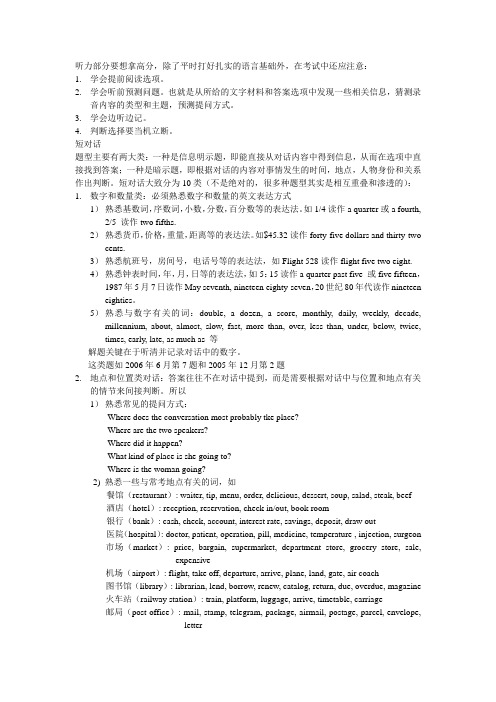
听力部分要想拿高分,除了平时打好扎实的语言基础外,在考试中还应注意:1.学会提前阅读选项。
2.学会听前预测问题。
也就是从所给的文字材料和答案选项中发现一些相关信息,猜测录音内容的类型和主题,预测提问方式。
3.学会边听边记。
4.判断选择要当机立断。
短对话题型主要有两大类:一种是信息明示题,即能直接从对话内容中得到信息,从而在选项中直接找到答案;一种是暗示题,即根据对话的内容对事情发生的时间,地点,人物身份和关系作出判断。
短对话大致分为10类(不是绝对的,很多种题型其实是相互重叠和渗透的):1.数字和数量类:必须熟悉数字和数量的英文表达方式1)熟悉基数词,序数词,小数,分数,百分数等的表达法。
如1/4读作a quarter或a fourth, 2/5 读作two fifths.2)熟悉货币,价格,重量,距离等的表达法。
如$45.32读作forty-five dollars and thirty-two cents.3)熟悉航班号,房间号,电话号等的表达法,如Flight 528读作flight five two eight.4)熟悉钟表时间,年,月,日等的表达法,如5:15读作a quarter past five 或five fifteen,1987年5月7日读作May seventh, nineteen eighty-seven,20世纪80年代读作nineteen eighties。
5)熟悉与数字有关的词:double, a dozen, a score, monthly, daily, weekly, decade, millennium, about, almost, slow, fast, more than, over, less than, under, below, twice, times, early, late, as much as 等解题关键在于听清并记录对话中的数字。
这类题如2006年6月第7题和2005年12月第2题2.地点和位置类对话:答案往往不在对话中提到,而是需要根据对话中与位置和地点有关的情节来间接判断。
英语六级听力短对话技巧
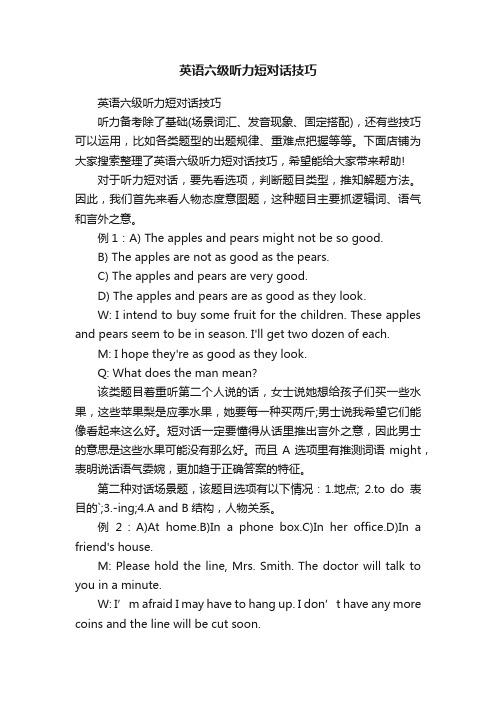
英语六级听力短对话技巧英语六级听力短对话技巧听力备考除了基础(场景词汇、发音现象、固定搭配),还有些技巧可以运用,比如各类题型的出题规律、重难点把握等等。
下面店铺为大家搜索整理了英语六级听力短对话技巧,希望能给大家带来帮助!对于听力短对话,要先看选项,判断题目类型,推知解题方法。
因此,我们首先来看人物态度意图题,这种题目主要抓逻辑词、语气和言外之意。
例1:A) The apples and pears might not be so good.B) The apples are not as good as the pears.C) The apples and pears are very good.D) The apples and pears are as good as they look.W: I intend to buy some fruit for the children. These apples and pears seem to be in season. I'll get two dozen of each.M: I hope they're as good as they look.Q: What does the man mean?该类题目着重听第二个人说的话,女士说她想给孩子们买一些水果,这些苹果梨是应季水果,她要每一种买两斤;男士说我希望它们能像看起来这么好。
短对话一定要懂得从话里推出言外之意,因此男士的意思是这些水果可能没有那么好。
而且A选项里有推测词语might,表明说话语气委婉,更加趋于正确答案的特征。
第二种对话场景题,该题目选项有以下情况:1.地点; 2.to do表目的`;3.-ing;4.A and B结构,人物关系。
例2:A)At home.B)In a phone box.C)In her office.D)In a friend's house.M: Please hold the line, Mrs. Smith. The doctor will talk to you in a minute.W: I’m afraid I may have to hang up. I don’t have any more coins and the line will be cut soon.Q: Where is Mrs. Smith most probably?该题目类型其实你把之前的场景词汇积累的够多,听的时候够敏感,就会由hold the line, hang up, line cut推出是在a phone box.例3:A) Whether to employ the woman.B) Whether to take up the new job.C) Whether to ask for a raise.D) Whether to buy a new house.M: You know, I’ m just not too sure if the new salary will be high enough or even the new position is really what I want. Besides, I like the work that I am doing now.W: It sounds as though you’ve already made up yo ur mind about what you are going to do.Q: What is the man thinking about?选项是不定式表目的,男士说他不太确定新的薪水是不是够高以及新的职位是不是自己想要的;他喜欢他现在的工作。
四六级听力

1 短对话部分 短对话听力的一些原则 1. 推理原则:一般需对对话进行推理,故直接在对话中听到的一般不是正确答案。
2. 挫折原则:通常要办的事情都是不顺利的(如买东西买不到,订房间客满等)3. 男女原则:一般男生比较衰,女生比较牛。
男生提出的观点女生都是不同意或有不同看法的,反之女生提出的观点男生都是同意和赞赏的。
男生的特征:脏、乱、差、浪费、穷、小气、不良习惯、迟钝、不顾家女生的特征:爱干净、节约、富有、好学、能干、聪明、大度、耐心、恋家、除数理化外成绩都很好4. 父母一般只有一个作用教育子女好好学习5. 除了父母教育子女外,家里(包括朋友家,阿姨家等等)发生的事情一般是不考的,故遇到地点推测题类似 at home / at Mary ’s home 之类的选项一般都是不对的。
6. 四级听力短对话只考日常生活学习中遇得到事情,问题,故如果选项中出现一些日常生活中不太可能发生或很少发生的事情一般不会是正确选项 短对话十大场景及一般思路 1. 借车:车一般是借不到的 2. 吃:匹萨,海鲜吃了一般会有不适反应,“派”一般比较好吃 3. 考试:作业、论文一般比较难,或须要熬夜教授一般比较严厉选修课较难较多4. 坐车(飞机、轮船):一般都需要等5. 事故(灾难):光明原则,一般不会死人6. 听讲座:题目一般是比较有趣丰富的,内容一般是比较复杂难懂的7. 论文:一般需要修改(polish )或重写(rewrite )8. 休闲:男生一般喜欢待在家里看TV 或者看moive ,女生一般喜欢高雅艺术如theater9. 医院:需要预约make an appointment10买票:基本上是买不到的短对话的常见场景1.学校场景 课程分类Optional course 选修课 Required course 必修课 Day course 白天的课Evening course 晚上的课 经常出现的科目或专业Chinese 中文English 英语mathematic 数学history 历史chemistry 化学Literature 文学 考试 Final exam 期终考试 middle exam 期中考试 make up 补考 test 测验 pop test 事先没有说好的测验 quiz 测验oral test 口试 考试临近 draw on / in sight of / draw nearly 考试延期或取消 delay / be off / defer / hold up / postpone / put off / suspend学校分类public school 公立学校private school 私立学校religious school 教会学校学校中的人president 校长2dean 院长professor 教授lecturer 讲师coordinator 管理员doctor 博士master 硕士bachelor 学士freshman 大一新生sophomore 大二学生junior 大三学生senior 大四学生图书馆借书 lend / borrow / check out参考书 reference book续借 renew过期 overdue还书 return罚金 fineattend / have a lecture 上课cut a class 逃课miss a class 错过了课scholarship 荣誉奖学金assistantship 助教奖学金teaching assistant 助教research assistant 助研semester 学期2.交通运输场景fare 车票licence 驾照rush hours 高峰时间traffic jam 交通堵塞 overtake 超车one way street 单行道over speed 超速police officer 交警ticket 罚单fine 罚金fast way / express way / high way 高速公路motor way 机动车道super way 飞机机动车道free way 免费高速公路交通工具(出现频率从高到低)plane / train (女) / bus / bike (女) / walk (女) / taxi(女):女生比较喜欢tunnel / channel 隧道ring road 环线subway (美) / underground (英) 地铁metro 地道地铁underpass 人行地道overhead 轻轨flyover 人行天桥mag – lev 磁悬浮take a taxi 乘出租车call a taxi 招出租车/订出租车catch a train / bus 赶火车/汽车3.电话场景mobile phone 手机pay phone 公用电话telephone box/booth 电话亭yellow page 黄页dial (拨电话号码) / press (按电话号码)extension 分机3 operator 总机 put~through 接通 wrong number / there is no one by this name 电话号码错了/ 没有这个人 is not in 不在?be not in hold on 不要挂断,稍等 take/leave a message 留言 hang up / get off 挂断 credit call 记账式电话 bill the call into the 3rd party 免费电话 collect call 对方付费电话 4.机场场景 plane / craft 飞机 book 订票 timetable 时间表 destination 目的地 open ticket one way ticket 单程票 round trip ticket 来回票 non-stop / direct flight 直航 transfer / lay over / stop over 转机 first / business / economy cabin 头等 / 商务 / 经济 舱 confirm the flight 确认航班 check in 登记 boarding card 登机牌 security check 安检 see off 送行 送别时的祝语keep in touch 保持联系safe landing 安全着陆board 登机take off 起飞departure 离港 safety / sect belt 安全带 land 着陆 arrival 进港 pick up 接机 5.公司场景 job vacancy 有空缺职位 letter of application 求职信 resume 简历 resume 包括几部分 basic / personal info. 基本信息/个人资料 academic background 教育背景 work experience 工作经验 certificates and honours interview 面试 offer 聘用信 work experience 工作经验 work overtime 加班 ask for a raise 加钱 wage 周薪 salary 日薪 bonus 奖金 allowance 津贴 annual income 年收入 promotion 升职 fire 解雇 resign 辞职retire 退休 laid-off 下岗 work / job / career / course 工作 post / position / vocation / title 职务 假期休息的说法(依次是从大到小)4 holiday 假日,假期 vacation 休假 annual leave 年假 sick leave 病假 rest 休息 break 指喝杯茶、喝杯咖啡的休息 coffee break away 离开一会 公司职位从大到小 chairman of the board president -- general manager —manager – department manager —head – officer – specialist (专员) -- clerk 6.租房场景 live on campus 住校 live off campus 住校外 for sale 可销售的房子 for rent / lease 可出租的房子 to let 可出租的房子 rent 租金 utilities 公用事业费 location 位置 suburb / downtown 市郊 / 市中心 condition 住房条件 furnished 配家具 unfurnished 无装修 leaking 漏水 blackout 断电 environment 环境 transportation 交通 land lord 房东 land lady 房东太太 tenant 房客 roommate 室友 好的室友:neat 整洁的 considerate 体贴的,细心的 不好的室友:messy / untidy 脏乱的 noisy 吵闹的 7.医院场景 see a doctor 去医院看医生 send for a doctor 让医生出诊 health center / clinic 卫生所 / 门诊部 physician 内科医生 surgeon 外科医生 dentist 牙医 make an appointment 预约 emergency 急诊 check up / exam 检查 cold (感冒)—— flu (流感) —— headache (头痛)—— sore throat (嗓子痛)—— fever (发烧)—— toothache (牙疼) —— stomachache (胃疼) prescribe 开药方 pill / tablet 药片 liquid 喝药水 injection => shot 注射 operation 手术 medical result 诊断结果 8.宾馆场景 make a reservation 预订房间 confirm a reservation 确认预订 cancel a reservation 取消预订 fully booked / full up / full 客满 porter 行旅员 tips 小费 reception 前台5 check in 登记入住 single room 单人房 double room 一张大床的双人房 twin room 两张单人床的双人房 suite 套房 bathroom toilet / w.c closet restroom 厕所 room service 客房服务 (四级听力中的客房服务一般只有考一种——送餐) lounge 男士用休息区 lobby 大堂 business center 商务中心 salon 美容厅 ball 舞厅 bar 酒吧 night club 夜总会 check out 退房 9.邮局场景 post / send / mail 寄 letter / mail 信 registered mail 挂号信 regular mail 平信 airmail 航空信 parcel / package 包裹telegram / cable 电报rate 费率overweight 超重postage 邮资email 电子邮件 reply 回复 forward 转发cc (carbon copy ) 抄送bcc (blind carbon copy )秘密抄送 subject 主题 attach 附件attachment 10.饭店场景 eat out 出去吃 take away 外带 fast food 快餐 book a table 订位子 waiter / waitness 服务员waitress menu 菜单 order 点菜 appetizer 开胃菜 main course 主食 dessert 餐后甜点 bill 账单 service charge 服务费 change 找零 tips 小费 keep the change 不用找零了 11.其他 closed 关门 open 开门office hours / business hours / working hours 工作时间,营业时间 关于开关 power on / off 开/关 turn on / off 开/关 switch on / off 开/ 关 (这个词只能用于与电有关的开关,不能用于水龙头之类的开关) 干杯cheers propose a toast to6 bottom upthe best book 最好的书圣经the best thing 最好的事情选择the last thing 最不愿意做的事情the last man 最不愿意见的人best seller 畅销的东西sell up 卖完,卖光 售罄sell out 卖完,卖光 售罄 / 出卖朋友或原则sell off 低价处理库存商品selling machine 自动售货机selling point 卖点count the days 渴望count on = dependent / rely on depend oncount in 把……考虑在内count for nothing 一钱不值count for little 无足轻重count for much 举足轻重count down 倒计时count up 相加count up to 共计 关于旅行traveljourney 陆上长途旅行trip 陆上短途旅行outing 远足stroll 散步wander 徘徊picnic 野餐camping 野营tour 周游cruise 水上短途旅行voyage 水上长途旅行 关于死亡的说法没有感情色彩的:die / end up / meat one ’s death / decease褒义的: pass away贬义的:kick the bucket关于和别人相处的好的说法get on with = get along (well) withbe in good term withlive in peace with关于强调point outemphasizelay / put emphasis ongive emphasis to达成协议找到出路find a way outreach an agreementreach a consensus关于“得失”gains and lossesgive and take关于拜访drop in / at / over / bystop in / over / bycall on sbcall at / round swlook in / uppay a visit topay / make a call to关于碰见,偶遇come acrossrun intobump intohappen to meet7关于花钱、花费的词 TakeSpend CostCharge Pay Buy关于水waterrunning / tap ~ 自来水fresh ~ 活水still ~ 死水pure ~ 纯净水purified ~ 净化水mineral ~ 矿泉水be used to do 被用于be used to dong 习惯于get used to doing 渐渐习惯于used to do 过去常常单复数意思不太一样的词ruin 毁灭 ruins 废墟authority 权威 authorities 当局brain 头脑 brains 智力,智慧custom 风俗习惯 customs 海关damage 破坏,损坏 damages 赔偿费ground 地面 土地 grounds 院子,监狱manner 礼貌 方式 manners 外貌minute 分钟 minutes 会议记录paper 纸张 papers 试卷time 时间 times 时代关于“调查”researchsurvey 市场调查opinion poll 名义调查民意调查questionnaire 问卷调查investigation 很正式的调查interview 会见,访谈belong to 属于participate in 参加be engaged in 从事、参加be involved in 卷入消磨时间kill timepass timecount one’s thumbs用完、缺少run out ofbe short ofbe lack in lack of / ina little 一点 not a little 很多a bit 一点 not a bit 一点也没有短对话中常用单词和句型1.表示期待、希望、渴望做某事的说法expect / hope / wishbe eager / anxious /dying tolook for ward towait / yean / thirst / long forcan not waitcounting the days2.下列词语与“but ”一样含有转折的的意思actually wellreallyin fact8 as a matter of fact to tell you the truth 3.表示建议的句型 how about …… 做……如何 I heard about …… 我听说…… If I were you …… 如果我是你…… It seems to me that …… 在我看来似乎…… Let ’s …… shall we ? 让我们……怎么样? Let us …… will you ? 让我们……怎么样? Shall I / we …… What about …… 做……如何 Why don ’t you …… 你为什么不…… Why not + 动词原型 为什么不…… Would you like …… 你要……吗? Wouldn ’t …… be better / wiser 做……不是更好吗? 4.表示同意、附和的句型 I agree with you ExactlyI couldn’t agree with you more / betterI think soI c an’t wait any minuteBelieve it or notI will …… if 假如……我就会It ’s my turn 轮到我了 我请客Why not ?You are rightI guess so 我猜也是No problem 没问题Of causeOut of question 毫无疑问So do I / me too 我也是Sure / absolutely / beautiful 当然,很好Good idea That sounds really nice 听起来真不错 5.表示询问的句型 Any questions / any thing wrong 有什么问题吗? Can you give me some ideas 可以给我一些建议吗? Do you know …… Do you want to…… Do you find any wrong with 你觉得……有什么不对劲吗? How long will it take 做什么要花多久 I am thinking of …… 我正在考虑做…… I suppose think …… 我猜想…… What ’s your plane plan 你的计划是什么? What happens if …… 如果……怎么办? What shall we do 我们该怎么做? 6.表示否定的句型Actually / as a matter of fact 事实上…… How can you do sth 你怎么可以…… I can ’t afford any disturbance 不要再烦我 I couldn’t agree with you I didn ’t men to 我本不打算 I don’t think so It doesn ’t matter 无所谓 I wish …… 但愿…… I ’d like to but 我很愿意但是…… I’d love to but I just ca n’t bear I am afraid not I am sorry but…… is not everything ……不是关键9 no bother / why bother 不要麻烦no , thanksreallyThat’s his opinionTo tell you the truthWell , as far as I know 7.表示“不得不”have to 表示客观上不得不做某事must 主观上的必须做某事be bound tocannot buthave no choice but8.表示“迟到”behind timebe delayed / overduebehind schedulebe late9.表示“紧张”trembleshake all overget one’s tongue tiedhave one’s mind go blanknervous10.以下词组听到后意思取反mean to 想要……planned to 原计划……intended to 原打算……tended toused to 过去常常……11.以下句型要引起重视,重点听取,就算本身不是考点也一定直接引向考点反意疑问句 ( ……,didn ’t you ?)反问句倒装句助动词 do / did / doesit is …… that / who / when …… 的句型正确答案的特征1. 含义肯定的不是正确选项,模糊的是正确选项意思具体的不是正确选项,概括的是正确选项意思详细的不是正确选项,抽象的是正确选项意思肤浅的不是正确选项,深刻的是正确选项2. 含有一下单词的一般是正确选项neither / either / also / besides / almost / especially / possibly / probably / likely perhaps / might / may / maybe / could /can / all / none3. 含有以下三种结构的一般可能是正确选项系表结构(系动词+标语表语) 比较结构(……than ……) 复合句4. 含有四级词汇替换项的一般是正确选项5. 表示“同意或不同意”,“喜欢或不喜欢”,“应该或不应该的”的一般为正确选项6. 以下三种选项一般其中有一个可能是正确选项反意项 形似项 近似项7. 同意项不可能是正确选项,等例排除。
大学英语六级听力短对话解题技巧

大学英语六级听力短对话解题技巧大学英语六级短对话共八道题,每道题对应一篇短对话,每个对话的时间约为20秒,乍看很简单,但每次考试时考生在该部分都失分严重,在此,为大家提供相应的解题方法,帮助考生提高正确率。
一、答题原则:所听非所得短对话中的混淆选项常常会出现录音中的只言片语,但与答案对应点的意思不符,正确选项往往是答案对应句的同意转述,因此,短对话切忌看到与原文完全相同的片段就选,要注意相关意群而不是个别单词或词组。
二、听前预测话题和问题预测对于提高短对话答题的正确率至关重要,因为它可以让考生在听对话时更有针对性,减轻考生听力负担,提高听力效率。
具体而言,根据选项进行预测主要有两方面,一方面是预测话题,另一方面是预测问题的类型。
短对话的常考话题主要有六类:学习、住宿、工作、饮食、交通和休闲。
其中,学习类包括学生与学生之间的对话和学生与老师之间的对话,话题的具体内容一般会涉及选课、论文、考试、学习方法等;住宿包括住校和校外租房;工作包括找工作、面试、工作情况等;饮食包括外出就餐、点单、付费等;交通主要涉及交通方式和堵车等;休闲类范围比较广,常考的有音乐会、美术馆、健身、旅游和约会等短对话的问题类型主要有四类:事实细节题(例如问是什么、做什么的题目)、观点态度题(例如问对话中的某一方对某事或某人的看法)、推理判断题(问题中涉及到imply, learn from, mean等词)和原因目的题(例如Why引起的问句)。
其中,事实细节题的选项常常是名词短语或动宾短语;观点态度题的选项中应该有形容词等表明态度的词语;推理判断题的选项通常是完整的陈述句;原因目的题的选项往往会出现不定式。
如果考生在听对话和问题前,能够根据选项判断出该对话的话题和问题类型,就可以对将要听到的对话有一个基本了解,大脑中有个预热的过程,为下一步做好准备。
三、听时集中注意力短对话的内容属于日常交际范畴,话语不会太过复杂或难以理解,但是由于录音只读一遍,考生稍不留神就可能错过了答题的信息点。
英语四级听力题型分析及解题技巧-短对话

一、短对话对于绝大多数英语学习者来说,从刚接触英语听力考试开始就有短对话这种最常见、最固定的题型。
短对话共有8个题目,占卷面总分的8%。
该部分一般是日常生活中的对话,即衣、食、住、行、工作、学习、生活等话题。
短对话具有如下特点:对话是一男一女的形式,每人说一句,然后提问,卷面只有选项,没有问题;美式英语发音和英式英语发音的混合对话。
短对话按题型分类主要有地点题、人物关系或身份职业题、数字计算题、请求和建议题、判断推理题、因果关系题、词汇和习惯用语理解题、观点态度题等。
各种题型的答题技巧在第二节中会作详细的讲解。
在做这部分题目的时候,除了要有扎实的听力基本功之外,还要掌握一定的方法。
1 熟悉常考场景及常用词汇大学英语四级听力短对话的场景每年都是比较固定的,在相同的场景中会使用到相同或相近的词汇,因此如果掌握了这些场景中的常用词汇,这对于提高听力理解能力起着非常重要的作用。
四级对话中常涉及的场景包括:诊所或医院(clinic or hospital)、餐馆(restaurant)、学校或校园(school or campus)、书店(bookstore)、火车站(railway station)、机场(airport)、图书馆(library)、邮局(post office)、银行(bank)、旅馆(hotel)等。
2 .预览选项,预测谈话内容,抓住重点最重要的是好好把握播音之前的时间,我们应该利用好这段时间来阅读选项。
阅读选项的过程中要注意以下两个方面的问题。
首先,根据选项预测对话内容和提问内容。
通过四个选项的对比和对关键词的研究,我们就会预测出对话的内容和将要提问到的问题,在听的过程中就会抓住重点,解答试题就会事半功倍。
【典型例题】(2006年6月)12. A) The woman does her own housework.B) The woman needs a housekeeper.C) The woman’s house is in a mess.D) The woman works as a housekeeper.显而易见,此题是有关housework的问题,因为四个选项中分别出现了does housework, needs housekeeper, house mess, work as housekeeper;由此推断此题是关于做家务方面的一个谈话,在听这则对话时,就可以轻而易举地对号入座了。
大学英语四级听力技巧
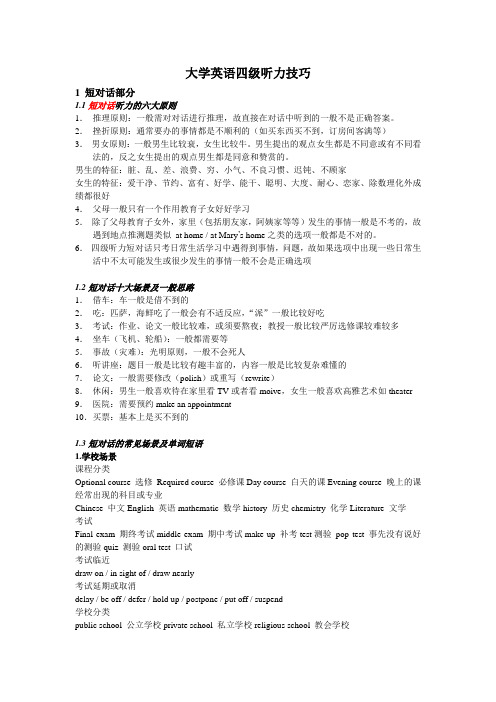
大学英语四级听力技巧1 短对话部分1.1短对话听力的六大原则1.推理原则:一般需对对话进行推理,故直接在对话中听到的一般不是正确答案。
2.挫折原则:通常要办的事情都是不顺利的(如买东西买不到,订房间客满等)3.男女原则:一般男生比较衰,女生比较牛。
男生提出的观点女生都是不同意或有不同看法的,反之女生提出的观点男生都是同意和赞赏的。
男生的特征:脏、乱、差、浪费、穷、小气、不良习惯、迟钝、不顾家女生的特征:爱干净、节约、富有、好学、能干、聪明、大度、耐心、恋家、除数理化外成绩都很好4.父母一般只有一个作用教育子女好好学习5.除了父母教育子女外,家里(包括朋友家,阿姨家等等)发生的事情一般是不考的,故遇到地点推测题类似at home / at Mary’s home之类的选项一般都是不对的。
6.四级听力短对话只考日常生活学习中遇得到事情,问题,故如果选项中出现一些日常生活中不太可能发生或很少发生的事情一般不会是正确选项1.2短对话十大场景及一般思路1.借车:车一般是借不到的2.吃:匹萨,海鲜吃了一般会有不适反应,“派”一般比较好吃3.考试:作业、论文一般比较难,或须要熬夜;教授一般比较严厉选修课较难较多4.坐车(飞机、轮船):一般都需要等5.事故(灾难):光明原则,一般不会死人6.听讲座:题目一般是比较有趣丰富的,内容一般是比较复杂难懂的7.论文:一般需要修改(polish)或重写(rewrite)8.休闲:男生一般喜欢待在家里看TV或者看moive,女生一般喜欢高雅艺术如theater 9.医院:需要预约make an appointment10.买票:基本上是买不到的1.3短对话的常见场景及单词短语1.学校场景课程分类Optional course 选修Required course 必修课Day course 白天的课Evening course 晚上的课经常出现的科目或专业Chinese 中文English 英语mathematic 数学history 历史chemistry 化学Literature 文学考试Final exam 期终考试middle exam 期中考试make up 补考test测验pop test 事先没有说好的测验quiz 测验oral test 口试考试临近draw on / in sight of / draw nearly考试延期或取消delay / be off / defer / hold up / postpone / put off / suspend学校分类public school 公立学校private school 私立学校religious school 教会学校学校中的人president 校长dean 院长professor 教授lecturer 讲师coordinator 管理员doctor 博士master 硕士bachelor 学士freshman 大一新生sophomore 大二学生junior 大三学生senior 大四学生图书馆借书lend / borrow / check out参考书reference book 续借renew过期overdue还书return 罚金fine教室attend / have a lecture 上课cut a class 逃课miss a class 错过了课scholarship 荣誉奖学金assistantship助教奖学金teaching assistant助教research assistant 助研2.交通运输场景fare 车票license 驾照rush hours 高峰时间traffic jam 交通堵塞overtake 超车one way street 单行道over speed 超速police officer 交警ticket 罚单fine 罚金fast way / express way / high way 高速公路motor way 机动车道super way 飞机机动车道free way 免费高速公路交通工具(出现频率从高到低)plane / train(女)/ bus / bike(女)/ walk(女)/ taxi (女):女生比较喜欢tunnel / channel 隧道ring road 环线subway(美)/ underground (英)地铁metro 地道overhead 轻轨flyover 人行天桥mag–lev (Magnetic Levitation) 磁悬浮3.电话场景mobile phone 手机pay phone 公用电话telephone box/booth 电话亭yellow page 黄页dial (拨电话号码)/ press (按电话号码)extension 分机operator 总机put~through 接通wrong number / there is no one by this name 电话号码错了/ 没有这个人is not in 不在hold on 不要挂断,稍等take/leave a message 留言hang up / get off 挂断credit call 记账式电话bill the call into the 3rd party 免费电话collect call 对方付费电话4.机场场景plane / craft 飞机book 订票timetable 时间表destination 目的地open ticket one way ticket 单程票round trip ticket 来回票non-stop / direct flight 直航transfer / lay over / stop over 转机first / business / economy cabin 头等/ 商务/ 经济舱confirm the flight 确认航班check in 登记boarding card 登机牌security check 安检see off 送行送别时的祝语keep in touch 保持联系safe landing 安全着陆board 登机take off 起飞departure 离港safety / sect belt 安全带land 着陆arrival 进港pick up 接机5.公司场景job vacancy 有空缺职位letter of application 求职信resume 简历resume包括几部分:basic / personal info. 基本信息/个人资料academic background 教育背景work experience 工作经验certificates and honours interview 面试offer 聘用信work experience 工作经验work overtime 加班ask for a raise 加钱wage 周薪salary 日薪bonus 奖金allowance 津贴annual income 年收入promotion 升职fire 解雇resign 辞职work / job / career / course 工作post / position / vocation / title 职务假期休息的说法(依次是从大到小)holiday 假日,假期vacation 休假annual leave 年假sick leave 病假rest 休息break 指喝杯茶、喝杯咖啡的休息coffee breakaway 离开一会6.租房场景live on campus 住校live off campus 住校外for sale 可销售的房子for rent / lease to let可出租的房子rent 租金utilities 公用事业费location 位置suburb / downtown 市郊/ 市中心condition 住房条件furnished 配家具unfurnished 无装修leaking 漏水blackout 断电environment 环境transportation 交通land lord 房东land lady 房东太太tenant 房客roommate 室友好的室友:neat 整洁的considerate 体贴的,细心的不好的室友:messy / untidy 脏乱的noisy 吵闹的7.医院场景see a doctor 去医院看医生send for a doctor 让医生出诊health center / clinic 卫生所/ 门诊部physician 内科医生surgeon 外科医生dentist 牙医make an appointment 预约emergency 急诊check up / exam 检查cold(感冒)—flu (流感)—headache (头痛)—sore throat (嗓子痛)—fever(发烧)—toothache(牙疼)—stomachache (胃疼)prescribe 开药方pill / tablet 药片liquid 喝药水injection 注射operation 手术medical result 诊断结果8.宾馆场景make a reservation 预订房间confirm a reservation 确认预订cancel a reservation 取消预订fully booked / full up / full 客满porter 行旅员tips 小费reception 前台check in 登记入住single room 单人房double room 一张大床的双人房twin room 两张单人床的双人房suite 套房bathroom toilet / w.c closet restroom 厕所room service 客房服务(四级听力中的客房服务一般只有考一种——送餐)lounge 男士用休息区lobby 大堂business center 商务中心salon 美容厅ball 舞厅bar 酒吧night club 夜总会check out 退房9.邮局场景post / send / mail 寄letter / mail 信registered mail 挂号信regular mail 平信airmail 航空信parcel / package 包裹telegram / cable 电报rate 费率overweight 超重postage 邮资email 电子邮件reply 回复forward 转发cc(carbon copy)抄送bcc(blind carbon copy)秘密抄送subject 主题attach 附件10.其他closed 关门open 开门office hours / business hours / working hours 工作时间,营业时间关于开关power on / off 开/关turn on / off 开/关switch on / off 开/ 关(这个词只能用于与电有关的开关,不能用于水龙头之类的开关)cheers propose a toast to bottom up干杯the best book 最好的书the best thing 最好的事情the last thing 最不愿意做的事情the last man 最不愿意见的人best seller 畅销sell up 卖完,卖光售罄sell out卖完,卖光售罄/ 出卖朋友或原则sell off 低价处理库存商品selling machine 自动售货机selling point 卖点count the days 渴望count on = dependent / rely on 依靠count in 把……考虑在内count for nothing 一钱不值count for little 无足轻重count for much 举足轻重count down 倒计时count up 相加count up to 共计1.4短对话中常用单词和句型1.表示期待、希望、渴望做某事的说法expect / hope / wish/ be eager / anxious /dying to / look for ward to / wait / yean / thirst / long for / can not wait / counting the days2.下列词语与“but”一样含有转折的的意思Actually well really in fact as a matter of fact to tell you the truth3.表示建议的句型how about……做……如何I heard about……我听说……If I were you ……如果我是你……It seems to me that……在我看来似乎……Let’s ……shall we ? 让我们……怎么样?Let us ……will you ? 让我们……怎么样?Shall I / we …… What about ……做……如何Why don’t you ……你为什么不……Why not + 动词原型为什么不……Would you like ……你要……吗?Wouldn’t ……be better / wiser 做……不是更好吗?4.表示同意、附和的句型I agree with you Exactly I couldn’t agree with you more / betterI think so I can’t wa it any minute Believe it or notI will ……if 假如……我就会It’s my turn 轮到我了我请客Why not ?You are right I guess so 我猜也是No problem 没问题Of causeOut of question 毫无疑问So do I / me too 我也是Sure / absolutely / beautiful 当然,很好Good idea That sounds really nice 听起来真不错5.表示询问的句型Any questions / any thing wrong 有什么问题吗?Can you give me some ideas 可以给我一些建议吗?Do you know ……Do you want to……Do you find any wrong with 你觉得……有什么不对劲吗?How long will it take 做什么要花多久I am thinking of ……我正在考虑做……I suppose think ……我猜想……What’s your plane 你的计划是什么?What happens if ……如果……怎么办?What shall we do 我们该怎么做?6.表示否定的句型Actually / as a matter of fact 事实上……How can you do sth 你怎么可以……I can’t afford any disturbance 不要再烦我I couldn’t agree with you/ I don’t think so我不同意I didn’t men to 我本不打算It doesn’t matter 无所谓I wish ……但愿……我很愿意但是……I’d like to but/ I’d love to but/ I just can’t bear/ I am afraid not/ I am sorry but ……is not everything ……不是关键no bother / why bother 不要麻烦no , thanks / really / That’s his opinion / To tell you the truth / Well , as far as I know7.表示“不得不”have to 表示客观上不得不做某事must 主观上的必须做某事be bound to / cannot but / have no choice but8.表示“迟到”behind time/ be delayed / overdue/ behind schedule / be late9.表示“紧张”Tremble s hake all over get one’s tongue tied have one’s mind go blank nervous10.以下词组听到后意思取反mean to 想要……planned to 原计划……intended to 原打算……tended to 倾向used to 过去常常……11.以下句型要引起重视,重点听取,就算本身不是考点也一定直接引向考点反意疑问句( ……,didn’t you ?) 倒装句助动词do / did / doesit is ……that / who / when……的强调句型2. 语段题部分2.1 语段题概述从文章题材来分:三分之二考说明文,三分之一考记叙文,偶尔也考议论文,新闻报道从文章内容来分:二分之一考社科类,三分之一考故事,其他还考自然科学,人物传记2.2语段题常考的八种文章1.学校题材(剑桥大学等)重点:学校的地理位置,资金来源,校园环境,师生情况,课程情况,图书馆,课外活动,学校特色2.机构介绍(监狱,图书馆等)重点:地点,规模,制度,专业3.社会热点重点:轰动效应,背景(产生的原因),大众观点,作者态度4.灾难题(毒品,车祸等)重点:问题类型,起因,危害,解决方法(尤其是科学家、研究人员提出的事实、观点、方法、结论)5.新闻题重点:when where who why which(what) how6.人物题重点:生卒年月、出生地、成就(贡献)、坎坷遭遇、结局7.科普题(太阳风等)重点:物体特征、形成原因、分类、最新研究发现和初步结论8.故事重点:主人公遭遇、变故、主人公做的决定、原因、结局2.3语段题10大解题原则1.听即原则:所听即所得,听到什么就选什么(正好与短对话相反,短对话时听到的一般不选)2.重读原则:某单词被反复读到或在语音上加以重读,应引起重视如果选项中出现很可能就是答案3.顺序原则:出题顺序一般与行文顺序相同除了主题题和部分说明文4.主题原则:主题一般出现在段落的头尾部分,所以要集中精力听清前三句话和最后两句话5.原因原则:凡出现表示原因,目的的很有可能是考点如:because so as 等词前后要着重听6.转则原则:凡出现表示转则的词如:but however yet 等,后面的句子往往是考点,要引起重视7.光明原则:事情一般都是向着好的方面发展的,主人公一般大难不死,事情总是绝处逢生8.男女原则:同短对话9.穷学生原则:学生一般都是比较穷的,不能继续学业一般都是因为经济原因,因为穷一般还比较喜欢DIY一些东西10.偏怪小原则:一般故事总是稀奇古怪的,经过总是曲折离奇的,结局总是出人意料的。
四级英语听力短对话技巧
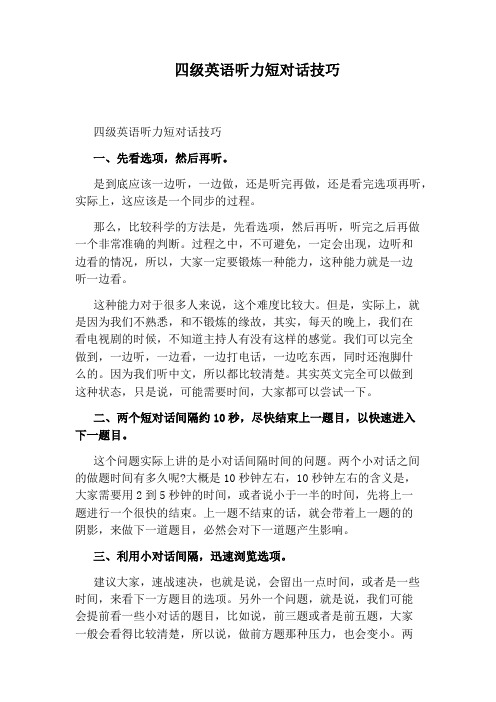
四级英语听力短对话技巧四级英语听力短对话技巧一、先看选项,然后再听。
是到底应该一边听,一边做,还是听完再做,还是看完选项再听,实际上,这应该是一个同步的过程。
那么,比较科学的方法是,先看选项,然后再听,听完之后再做一个非常准确的判断。
过程之中,不可避免,一定会出现,边听和边看的情况,所以,大家一定要锻炼一种能力,这种能力就是一边听一边看。
这种能力对于很多人来说,这个难度比较大。
但是,实际上,就是因为我们不熟悉,和不锻炼的缘故,其实,每天的晚上,我们在看电视剧的时候,不知道主持人有没有这样的感觉。
我们可以完全做到,一边听,一边看,一边打电话,一边吃东西,同时还泡脚什么的。
因为我们听中文,所以都比较清楚。
其实英文完全可以做到这种状态,只是说,可能需要时间,大家都可以尝试一下。
二、两个短对话间隔约10秒,尽快结束上一题目,以快速进入下一题目。
这个问题实际上讲的是小对话间隔时间的问题。
两个小对话之间的做题时间有多久呢?大概是10秒钟左右,10秒钟左右的含义是,大家需要用2到5秒钟的时间,或者说小于一半的时间,先将上一题进行一个很快的结束。
上一题不结束的话,就会带着上一题的的阴影,来做下一道题目,必然会对下一道题产生影响。
三、利用小对话间隔,迅速浏览选项。
建议大家,速战速决,也就是说,会留出一点时间,或者是一些时间,来看下一方题目的选项。
另外一个问题,就是说,我们可能会提前看一些小对话的题目,比如说,前三题或者是前五题,大家一般会看得比较清楚,所以说,做前方题那种压力,也会变小。
两方面,一个是,提前看题,第二件事,是利用小对话之间的间隔,将选项进行这样一个浏览和阅读。
技巧1听到什么不选什么严格来说,“听到什么不选什么”是一个颇有风险的“技巧”。
可是,正如风险投资一样,风险越高,回报率也就越高。
此外,由于短对话很“短”,来来回回就两三句话,考点挖掘的.余地全在对话的几个词。
因此,命题者必然要在选项上做文章,如通过将原文的词汇加以组合,拼凑成与原文“貌合神离”的干扰选项,让没有听懂全文、只听到个别词句的考生上当受骗。
大学英语四级考试听力笔记
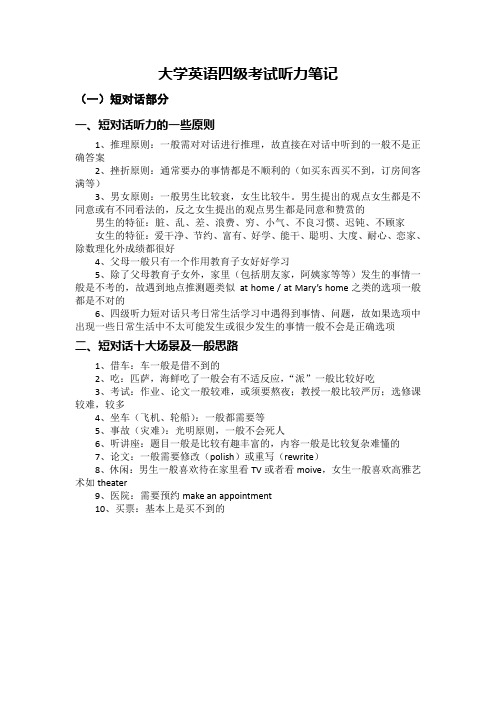
大学英语四级考试听力笔记(一)短对话部分一、短对话听力的一些原则1、推理原则:一般需对对话进行推理,故直接在对话中听到的一般不是正确答案2、挫折原则:通常要办的事情都是不顺利的(如买东西买不到,订房间客满等)3、男女原则:一般男生比较衰,女生比较牛。
男生提出的观点女生都是不同意或有不同看法的,反之女生提出的观点男生都是同意和赞赏的男生的特征:脏、乱、差、浪费、穷、小气、不良习惯、迟钝、不顾家女生的特征:爱干净、节约、富有、好学、能干、聪明、大度、耐心、恋家、除数理化外成绩都很好4、父母一般只有一个作用教育子女好好学习5、除了父母教育子女外,家里(包括朋友家,阿姨家等等)发生的事情一般是不考的,故遇到地点推测题类似at home / at Mary’s home之类的选项一般都是不对的6、四级听力短对话只考日常生活学习中遇得到事情、问题,故如果选项中出现一些日常生活中不太可能发生或很少发生的事情一般不会是正确选项二、短对话十大场景及一般思路1、借车:车一般是借不到的2、吃:匹萨,海鲜吃了一般会有不适反应,“派”一般比较好吃3、考试:作业、论文一般较难,或须要熬夜;教授一般比较严厉;选修课较难,较多4、坐车(飞机、轮船):一般都需要等5、事故(灾难):光明原则,一般不会死人6、听讲座:题目一般是比较有趣丰富的,内容一般是比较复杂难懂的7、论文:一般需要修改(polish)或重写(rewrite)8、休闲:男生一般喜欢待在家里看TV或者看moive,女生一般喜欢高雅艺术如theater9、医院:需要预约make an appointment10、买票:基本上是买不到的三、短对话的常见场景1、学校场景课程分类Optional course 选修课Required course 必修课Day course 白天的课Evening course 晚上的课经常出现的科目或专业Chinese 中文English 英语Mathematic 数学History 历史Chemistry 化学Literature 文学考试Final exam 期终考试middle exam 期中考试make up 补考test测验pop test 事先没有说好的测验quiz 测验oral test 口试考试临近draw onin sight ofdraw nearly考试延期或取消delaybe offdeferhold uppostponeput offsuspend 学校分类public school 公立学校private school 私立学校religious school 教会学校学校中的人president 校长dean 院长professor 教授lecturer 讲师coordinator 管理员doctor 博士master 硕士bachelor 学士freshman 大一新生sophomore 大二学生junior 大三学生senior 大四学生图书馆借书lend / borrow / check out参考书reference book续借renew过期overdue还书return罚金fineattend / have a lecture 上课cut a class 逃课miss a class 错过了课scholarship 荣誉奖学金assistantship 助教奖学金teaching assistant 助教research assistant 助研semester 学期2、交通运输场景fare 车票licence 驾照rush hours 高峰时间traffic jam 交通堵塞overtake 超车one way street 单行道over speed 超速police officer 交警ticket 罚单fine 罚金fast way / express way / high way 高速公路motor way 机动车道super way 飞机机动车道free way 免费高速公路交通工具(出现频率从高到低)plane / train(女)/ bus / bike(女)/ walk(女)/ taxi (女):女生比较喜欢tunnel / channel 隧道ring road 环线subway(美)/ underground (英)地铁metro 地道地铁underpass人行地道overhead 轻轨flyover 人行天桥mag –lev 磁悬浮take a taxi 乘出租车call a taxi 招出租车/订出租车catch a train / bus 赶火车/汽车3.电话场景mobile phone 手机pay phone 公用电话telephone box/booth 电话亭yellow page 黄页dial (拨电话号码)/ press (按电话号码)extension 分机operator 总机put~through 接通wrong number / there is no one by this name 电话号码错了/ 没有这个人is not in 不在?be not inhold on 不要挂断,稍等take/leave a message 留言hang up / get off 挂断credit call 记账式电话bill the call into the 3rd party 免费电话collect call 对方付费电话4.机场场景plane / craft 飞机book 订票timetable 时间表destination 目的地one way ticket 单程票round trip ticket 来回票non-stop / direct flight 直航transfer / lay over / stop over 转机first / business / economy cabin 头等/ 商务/ 经济舱confirm the flight 确认航班check in 登记boarding card 登机牌security check 安检see off 送行送别时的祝语keep in touch 保持联系safe landing 安全着陆board 登机take off 起飞departure 离港safety / sect belt 安全带land 着陆arrival 进港pick up 接机5.公司场景job vacancy 有空缺职位letter of application 求职信resume 简历resume包括几部分basic / personal info. 基本信息/个人资料academic background 教育背景work experience 工作经验certificates and honoursinterview 面试offer 聘用信work experience 工作经验work overtime 加班ask for a raise 加钱wage 周薪salary 日薪bonus奖金allowance 津贴annual income 年收入promotion 升职fire 解雇resign 辞职retire 退休work / job / career / course 工作post / position / vocation / title 职务假期休息的说法(依次是从大到小)holiday 假日,假期vacation 休假annual leave 年假sick leave 病假rest 休息break 指喝杯茶、喝杯咖啡的休息coffee breakaway 离开一会公司职位从大到小chairman of the boardpresident -- general manager—manager –department manager—head –officer –specialist(专员)-- clerk6.租房场景live on campus 住校live off campus 住校外for sale 可销售的房子for rent / lease 可出租的房子to let 同上rent 租金utilities 公用事业费location 位置suburb / downtown 市郊/ 市中心condition 住房条件furnished 配家具unfurnished 无装修leaking 漏水blackout 断电environment 环境transportation 交通land lord 房东land lady 房东太太tenant 房客roommate 室友好的室友:neat 整洁的considerate 体贴的,细心的不好的室友:messy / untidy 脏乱的noisy 吵闹的7.医院场景see a doctor 去医院看医生send for a doctor 让医生出诊health center / clinic 卫生所/ 门诊部physician 内科医生surgeon 外科医生dentist 牙医make an appointment 预约emergency 急诊check up / exam 检查cold(感冒)——flu (流感)——headache (头痛)——sore throat(嗓子痛)——fever(发烧)——toothache(牙疼)——stomachache (胃疼)prescribe 开药方pill / tablet 药片liquid 喝药水injection => shot 注射operation 手术medical result 诊断结果8.宾馆场景make a reservation 预订房间confirm a reservation 确认预订cancel a reservation 取消预订fully booked / full up / full 客满porter 行旅员tips 小费reception 前台check in 登记入住single room 单人房double room 一张大床的双人房twin room 两张单人床的双人房suite 套房bathroom toilet / w.c closet restroom 厕所room service 客房服务(四级听力中的客房服务一般只有考一种——送餐)lounge 男士用休息区lobby 大堂business center 商务中心salon 美容厅ball 舞厅bar 酒吧night club 夜总会check out 退房9.邮局场景post / send / mail 寄letter / mail 信registered mail 挂号信regular mail 平信airmail 航空信parcel / package 包裹telegram / cable 电报rate 费率overweight 超重postage 邮资email 电子邮件reply 回复forward 转发cc(carbon copy)抄送bcc(blind carbon copy)秘密抄送subject 主题attach 附件attachment10.饭店场景eat out 出去吃take away 外带fast food 快餐book a table 订位子waiter / waitness 服务员waitressmenu 菜单order 点菜appetizer 开胃菜main course 主食dessert 餐后甜点bill 账单service charge 服务费change 找零tips 小费keep the change 不用找零了11.其他closed 关门open 开门office hours / business hours / working hours 工作时间,营业时间关于开关power on / off 开/关turn on / off 开/关switch on / off 开/ 关(这个词只能用于与电有关的开关,不能用于水龙头之类的开关)干杯cheerspropose a toast tobottom upthe best book 最好的书圣经the best thing 最好的事情选择the last thing 最不愿意做的事情the last man 最不愿意见的人best seller 畅销的东西sell up 卖完,卖光售罄sell out卖完,卖光售罄/ 出卖朋友或原则sell off 低价处理库存商品selling machine 自动售货机selling point 卖点count the days 渴望count on = dependent / rely on depend oncount in 把……考虑在内count for nothing 一钱不值count for little 无足轻重count for much 举足轻重count down 倒计时count up 相加count up to 共计关于旅行traveljourney 陆上长途旅行trip 陆上短途旅行outing 远足stroll 散步wander 徘徊picnic 野餐camping 野营tour 周游cruise 水上短途旅行voyage 水上长途旅行关于死亡的说法没有感情色彩的:die / end up / meat one’s death / decease 褒义的:pass away贬义的:kick the bucket关于和别人相处的好的说法get on with = get along (well) withbe in good term withlive in peace with关于强调point outemphasizelay / put emphasis ongive emphasis to达成协议找到出路find a way outreach an agreementreach a consensus关于“得失”gains and lossesgive and take关于拜访drop in / at / over / bystop in / over / bycall on sbcall at / round swlook in / uppay a visit topay / make a call to关于碰见,偶遇come acrossrun intobump intohappen to meet关于花钱、花费的词Take Spend Cost Charge Pay Buy 关于水waterrunning / tap ~ 自来水fresh ~ 活水still ~ 死水pure ~ 纯净水purified ~ 净化水mineral ~ 矿泉水be used to do 被用于be used to dong 习惯于get used to doing 渐渐习惯于used to do 过去常常单复数意思不太一样的词ruin 毁灭ruins 废墟authority 权威authorities 当局brain 头脑brains 智力,智慧custom 风俗习惯customs 海关damage 破坏,损坏damages 赔偿费ground 地面土地grounds 院子,监狱manner 礼貌方式manners 外貌minute 分钟minutes 会议记录paper 纸张papers 试卷time 时间times 时代关于“调查”researchsurvey 市场调查opinion poll 名义调查民意调查questionnaire 问卷调查investigation 很正式的调查interview 会见,访谈belong to 属于participate in 参加be engaged in 从事、参加be involved in 卷入消磨时间kill timepass timecount one’s thumbs用完、缺少run out ofbe short ofbe lack in lack of / ina little 一点not a little 很多a bit 一点not a bit 一点也没有短对话中常用单词和句型1.表示期待、希望、渴望做某事的说法expect / hope / wishbe eager / anxious /dying tolook for ward towait / yean / thirst / long forcan not waitcounting the days2.下列词语与“but”一样含有转折的的意思actuallywellreallyin factas a matter of factto tell you the truth3.表示建议的句型how about……做……如何I heard about……我听说……If I were you ……如果我是你……It seems to me that……在我看来似乎……Let’s ……shall we ? 让我们……怎么样?Let us ……will you ? 让我们……怎么样?Shall I / we ……What about ……做……如何Why don’t you ……你为什么不……Why not + 动词原型为什么不……Would you like ……你要……吗?Wouldn’t ……be better / wiser 做……不是更好吗?4.表示同意、附和的句型I agree with youExactlyI couldn’t agree with you more / betterI think soI can’t wait any minuteBelieve it or notI will ……if 假如……我就会It’s my turn 轮到我了我请客Why not ?You are rightI guess so 我猜也是No problem 没问题Of causeOut of question 毫无疑问So do I / me too 我也是Sure / absolutely / beautiful 当然,很好Good ideaThat sounds really nice 听起来真不错5.表示询问的句型Any questions / any thing wrong 有什么问题吗?Can you give me some ideas 可以给我一些建议吗?Do you know ……Do you want to……Do you find any wrong with 你觉得……有什么不对劲吗?How long will it take 做什么要花多久I am thinking of ……我正在考虑做……I suppose think ……我猜想……What’s your plane plan 你的计划是什么?What happens if ……如果……怎么办?What shall we do 我们该怎么做?6.表示否定的句型Actually / as a matter of fact 事实上……How can you do sth 你怎么可以……I can’t afford any disturbance 不要再烦我I couldn’t agree with youI didn’t men to 我本不打算I don’t thin k soIt doesn’t matter 无所谓I wish ……但愿……I’d like to but 我很愿意但是……I’d love to butI just can’t bearI am afraid notI am sorry but……is not everything ……不是关键no bother / why bother 不要麻烦no , thanksreallyThat’s his opinionTo tell you the truthWell , as far as I know7.表示“不得不”have to 表示客观上不得不做某事must 主观上的必须做某事be bound tocannot buthave no choice but8.表示“迟到”behind timebe delayed / overduebehind schedulebe late9.表示“紧张”trembleshake all overget one’s tongue tiedhave one’s mind go bl anknervous10.以下词组听到后意思取反mean to 想要……planned to 原计划……intended to 原打算……tended toused to 过去常常……11.以下句型要引起重视,重点听取,就算本身不是考点也一定直接引向考点反意疑问句( ……,didn’t you ?)反问句倒装句助动词do / did / doesit is ……that / who / when……的句型正确答案的特征1.含义肯定的不是正确选项,模糊的是正确选项意思具体的不是正确选项,概括的是正确选项意思详细的不是正确选项,抽象的是正确选项意思肤浅的不是正确选项,深刻的是正确选项2.含有一下单词的一般是正确选项neither / either / also / besides / almost / especially / possibly / probably / likely perhaps / might / may / maybe / could /can / all / none3.含有以下三种结构的一般可能是正确选项系表结构(系动词+标语表语)比较结构(……than……)复合句4.含有四级词汇替换项的一般是正确选项5.表示“同意或不同意”,“喜欢或不喜欢”,“应该或不应该的”的一般为正确选项6.以下三种选项一般其中有一个可能是正确选项反意项形似项近似项7.同意项不可能是正确选项,等例排除。
- 1、下载文档前请自行甄别文档内容的完整性,平台不提供额外的编辑、内容补充、找答案等附加服务。
- 2、"仅部分预览"的文档,不可在线预览部分如存在完整性等问题,可反馈申请退款(可完整预览的文档不适用该条件!)。
- 3、如文档侵犯您的权益,请联系客服反馈,我们会尽快为您处理(人工客服工作时间:9:00-18:30)。
听力技巧四六级听力十大做题原则1.主要内容原则2.重要细节原则3.重复、重读原则4.强调原则5.原因原则6.解释原则7.人名原则8.问答原则(语段)9.建议原则10.But 原则短对话部分题型:1.地点题与去向题(关键词)2.推断题(暗示型和直接型):关键词、语气、语调、重音3.原因与结果题这类题的卷面特征可概括如下:1) 4个选项通常都是完整的陈述句;2) 至少有一个选项暗示出该事实能导致某种结果,通常有好几个选项的事实能导致同一结果;3) 选项中可能出现can ’t, not be able to,too...to,have to等词或词组。
此外,从提问上也可以判断出此题类型,原因结果题经常会以why、what reason等词提问。
4.职业与身份题常见的设问有:1) Who (what) is the man/woman? 2) What is the probable relationship between the man and the woman? 3) What is the probable relationship between the two speakers? 4) What is Mary/Tom/John...? 5) What is the man ’s/woman ’s profession/occupation? 6) What kind of job does John probably do?5.细节事实题(时间题:注意加减问题,一般直接听到的不是答案----做笔记)短对话听力的一些原则1.推理原则:一般需对对话进行推理,故直接在对话中听到的一般不是正确答案。
2.挫折原则:通常要办的事情都是不顺利的(如买东西买不到,订房间客满等)3.男女原则:一般男生比较衰,女生比较牛。
男生提出的观点女生都是不同意或有不同看法的,反之女生提出的观点男生都是同意和赞赏的。
男生的特征:脏、乱、差、浪费、穷、小气、不良习惯、迟钝、不顾家女生的特征:爱干净、节约、富有、好学、能干、聪明、大度、耐心、恋家、除数理化外成绩都很好4.四级听力短对话只考日常生活学习中遇的到事情,问题,故如果选项中出现一些日常生活中不太可能发生或很少发生的事情一般不会是正确选项短对话中常用单词和句型1.表示期待、希望、渴望做某事的说法expect / hope / wish /be eager / anxious /dying to /look for ward to /yean / thirst / long for / can not wait / counting the days2.下列词语与“but”一样含有转折的意思actually/ well / really / in fact / as a matter of fact / to tell you the truth3.表示建议的句型how about…… 做……如何I heard about…… 我听说…… If I were you …… 如果我是你…… It seems to me that…… 在我看来似乎…… Let’s …… shall we ? 让我们……怎么样?Let us …… will you ? 让我们……怎么样?Shall I / we …… What about …… 做……如何Why don’t you …… 你为什么不…… Why not + 动词原型为什么不…… Would you like …… 你要……吗?Wouldn’t …… be better / wiser 做……不是更好吗?4.表示同意、附和的句型I agree with you Exactly I couldn’t agree with you more / better I think so I can’t wait any minute Believe it or not I will …… if 假如……我就会It’s my turn 轮到我了我请客Why not ? You are right I guess so 我猜也是No problem 没问题Of cause Out of question 毫无疑问So do I / me too 我也是Sure / absolutely / beautiful 当然,很好Good idea That sounds really nice 听起来真不错5.表示询问的句型Any questions / any thing wrong 有什么问题吗?Can you give me some ideas 可以给我一些建议吗?Do you know …… Do you want to…… Do you find any wrong with 你觉得……有什么不对劲吗?How long will it take 做什么要花多久I am thinking of …… 我正在考虑做…… I suppose think …… 我猜想…… What’s your plane 你的计划是什么?What happens if …… 如果……怎么办?What shall we do 我们该怎么做?6.表示否定的句型Actually / as a matter of fact 事实上…… How ca n you do sth 你怎么可以…… I can’t afford any disturbance 不要再烦我I couldn’t agree with you I didn’t men to 我本不打算I don’t think so It doesn’t matter 无所谓I wish …… 但愿…… I’d like to but 我很愿意但是…… I’d love to but I just can’t bear I am afraid not I am sorry but …… is not everything ……不是关键no bother / why bother 不要麻烦no , thanks really That’s his opinion To tell you the truth Well , as far as I know7.表示“不得不”have to 表示客观上不得不做某事must 主观上的必须做某事be bound to/ cannot but have no choice but8.表示“迟到” behind time/ be delayed / overdue / behind schedule/ be late9.表示“紧张” tremble / shake all over/ get one’s tongue tied / have one’s mind go blank / nervous10.以下词组听到后意思取反mean to 想要…… planned to 原计划…… intended to 原打算…… tended to / used to 过去常常……11.以下句型要引起重视,重点听取,就算本身不是考点也一定直接引向考点反意疑问句( ……,didn’t you ?) 反问句倒装句助动词do / did / does it is …… that / who / when…… 的句型正确答案的特征1.含义肯定的不是正确选项,模糊的是正确选项意思具体的不是正确选项,概括的是正确选项意思详细的不是正确选项,抽象的是正确选项意思肤浅的不是正确选项,深刻的是正确选项2.含有一下单词的一般是正确选项neither / either / also / besides / almost / especially / possibly / probably / likelyperhaps / might / may / maybe / could /can / all / none3.含有以下三种结构的一般可能是正确选项系表结构(系动词+标语)比较结构(……than……)复合句4.含有四级词汇替换项的一般是正确选项5.表示“同意或不同意”,“喜欢或不喜欢”,“应该或不应该的”的一般为正确选项6.以下三种选项一般其中有一个可能是正确选项反意项形似项近似项7.同意项不可能是正确选项,等例排除。
8.绝对化选项,一般不是正确答案,可直接排除关于时间推断题1.直接听到的不选2.极限值即值最大和最小的选项一般不选长对话题型:1.细节题--考查地点.时间.人物关系考查地点:Where does this conversation probably take place? /Where did it happen? What kind of store is she going to?考查时间:(1)多个时间选一个(做笔记)(2)运算When does this conversation probably take place? /How long did it take the man to write this paper?考查地点:What is the probable relationship between the two speakers?答题技巧:(1)答案是对话细节的再现(2)答案是对话细节的同义转述即听到的是解或同义转述的是解(3)做笔记,听清几个孤立的线索词(关键词)就可拿下全分2.主旨题--谈话的主旨大意(概括的是解)概括性而非零散的细节性的东西。
(1)选项中有比较抽象的.概括性的词语(2)或者该选项能够包含其他几个选项的内容What are the two speakers talking about? / What are the speakers mainly discussing?3.推理题:听到的不是解What can we nfer from the conversation?(1)对话意图:What's the main purpose of the research?(2)评价题型:意见.看法.态度(注意语气,语音,语调)What does the woman think of ....?/How about...?(3)原因:因在前,果在后/果前因后Why....?长对话技巧总结:1.听之前先读题(在读direction时预读选项):边看边画,减少听的信息量如:重点词:~~最容易混淆的地方:____2.速读全部选项--各题四个选项涉及的人物.地点.场合--暴露该题的主题--预测建立一个大概的场景3.用到所有的信息:四个选项都有用结合四个选项的共同点--得到大量提示真正听时可和录音给出的信息进行比较,轻易排除错误项,得出正确答案4.注意朗读人的语气:如转折词,表因果关系的词,表递进关系的词,表示强调的词5.注意重复信息6.信号词应急:1.选项中有原词或原词的同义词或近义词的极有可能是解2.意思相反的两个选项3.带有不确定词来表达作者观点的.表义不绝对的选项常为答案短文部分(不怕长段听清重点)考题类型:主旨题、细节题、推断题,其中细节题是重点语段题6大解题原则1.听即原则:所听即所得,听到什么就选什么(正好与短对话相反,短对话时听到的一般不选)2.重读原则:某单词被反复读到或是在语音上加以重读,因引起重视如果选项中出现很可能是正确答案3.顺序原则:出题顺序一般与行文顺序相同除了主题题和部分说明文4.主题原则:主题一般出现在段落的头尾部分,所以要集中精力听清前三句话和最后两句话5.原因原则:凡出现表示原因,目的的很有可能是考点如:because ,so ,as 等词前后要着重听6.转则原则:凡出现表示转则的词如:but ,however,yet 等,后面的句子往往是考点,要引起重视短文题的做题步骤1.先预读备选项,从备选项推测文章的体裁和大致内容,增加听的目的性和针对性2.首句一定要理解3.根据六大原则和该类文章的重点大致推测考点可能出现的位置4.听语段,尤其抓住标志词,确定考点,边听文章边看选项,按照听到的顺序给选项标号5.听问题,将原文的意思对应选项。
